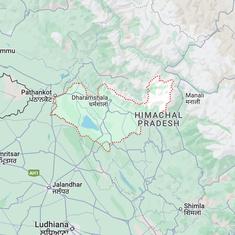Growing Up in This Neighbourhood
You have daily battles to fight:
when it rains, you find ways
to cover things in the rooms
of your oddly built house
that has shamelessly outlived
your ancestors —
Holding a twenty rupee note
safely in your hand
like a cat
carries a kitten in her mouth
fearing to lose it —
walking on bricks
thrown into muddy rainwater
to make a path —
the familiar sight of rats
coming out of the gutter
which has always been uncovered —
crossing in front of the house
of the single mother
everyone wants thrown out
of the neighbourhood —
passing by the little mosque
built on a paan shop,
whose imam coughs into a loudspeaker
five times a day —
buying curd for ten rupees, a tea sachet for six,
and using the remaining coins
to buy something from the tiny stall
of the Urdu-speaking old man
with a thin moustache
you wonder: even if someone buys everything
from this man, what difference would it make?
Growing up in this neighbourhood
doesn’t mean you won’t experience
the sheer meaninglessness
of it all —
and of whatever exists
beyond these suburbs
where the lights never fade.
The dim yellow bulb
hanging in your narrow alleyway
is no different from the sun
which dies a little every day.
My Father Believes in Triclavianism
The innards of a grinder,
dead batteries, bulbs,
some wires and metal strings,
a toaster without the bread rack,
and several little springs
lie in the backyard
while he tries to find
what we never thought existed
in our everyday things.
Back in the day,
we fried daal in this pan.
Father used that oven to bake.
My mother used this dryer
on her wet hair, with the familiar scent
of the shampoo
they no longer make.
He dismantles
the abandoned vacuum cleaner:
puts aside its brush roller,
power-head and wand;
brings out the internal fan,
and the little dust bag
which might still have dust
from past days.
The ragman is only interested in metal:
he rips apart the colourful bodies
of our appliances
to dig for inner mysteries.
How much iron
does the human body have?
My father once wrote a story
about that:
“We have enough to make
three iron nails,”
he said.
Her Science Teacher Tells Her the Properties of Matter
Soaked by a light drizzle,
running on a muddy path
amidst the sugarcane fields,
while ripe crops sway
in a soft breeze
and men slowly sip tea
squatting under the old banyan tree,
she reaches her school
where each child has a similar bag
and the teachers use gadgets
with stickers of the American flag.
When her science teacher tells her
that wood is a structural tissue
made of different cells
sharing a common chemical composition:
50 per cent carbon and 42 per cent oxygen,
she silently nods,
though deep in her heart
she knows it’s lame.
Her grandmother’s
wooden prayer beads
and the broken pieces
of her slain father’s sitar
are different things —
they can never be
the same.
October
October was something else.
The only month which returned
each year unchanged.
You noticed the glimpses of God
in the wrinkles of old peasants
as you spoke of an eternal godlessness.
You walked for miles with them.
You sang ballads of the year
that you thought could bring
an endless spring.
You relied on a language
not your own:
“Dialectical materialism”
always found space
amidst our bodies’ warmth.
And once the month ended,
autumn always returned
to our garden,
where each leaf looked different
but had a similar way of falling.

Excerpted with permission from The Missing Prayer, Ammar Aziz, Red River Press.










